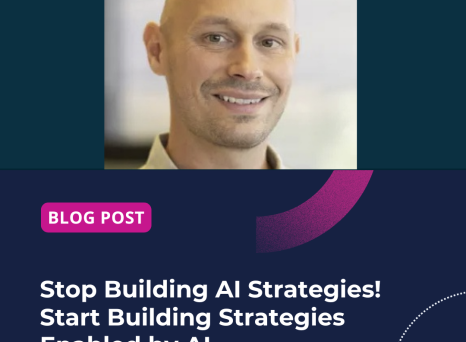A recent Gartner press release made a bold claim about the future of project management:
By 2030, 80% of the work of today's project management (PM) discipline will be eliminated as AI takes on traditional PM functions.
If you're an IT project manager, that might be concerning news! Thankfully, it's not the full story.
Gartner is a reputable source, so why is an equally trustworthy outlet like the Project Management Institute predicting that we'll still need 88 million humans working in project management around the world by 2027?
The discrepancy highlights the importance of phrasing: Gartner says that 80% of today's project management tasks will be eliminated, not tomorrow's.
To explain further, we'll take a look at the current state of project management AI, its potential future, and what they both mean for job security.
AI as It Stands: Limited, but Effective
There are currently two ways in which AI is most commonly integrated into PPM tools (like Planisware, of course!). While both fall short of what's known as "artificial general intelligence", they're useful additions to a project manager's toolset.
Their relative lack of complexity may prove useful from an upskilling perspective: today's project managers are being afforded the opportunity to get to grips with 'assistants' that are more independent and technologically-complex, but still manageable for a layperson. It's a chance to get comfortable with the basics of artificially-intelligent project management tools and build a solid foundation of knowledge to build upon as AI's capabilities expand.
There's no better way to break the ice with virtual assistants than to talk to them:
1) Chatbots That Actually Chat
Thanks to the progress that's been made in natural language processing, AI is able to fetch specific answers to intuitively-worded questions like “how do I…?” or “what is status of …?”. That may sound pretty basic, but it can be a significant time-saver for project managers that are regularly inundated with process-related questions. Even the least tech-savvy colleagues can now communicate with chatbots using language they're used to, and get the answers they need.
Smart bots are also able to perform actions such as "update task to done...". Think about how convenient it is to ask Siri or Alexa to set an alarm, identify a song or convert ounces to grams. Apply that to the most common, repetitive tasks in your project management platform, and the utility of a digital assistant you can talk to becomes clear.
What's more, the best chatbots eliminate ambiguity by letting you know when they're confused. When a user's question or data input is vague or poorly-formatted, bots will ask questions to narrow things down to something they can fully understand.
2) Predictive Estimation
Tools that help people make educated predictions about project outcomes are not new. Static, algorithm-assisted estimation based on existing models or parameters has been around for a very long time. AI-powered estimation goes one step further by using machine learning to discover the key drivers and trends behind ongoing and dynamic sets of data.
With that information, it can then estimate the likely duration or cost of the projects. In other scenarios it's able to estimate the likelihood of a specific event, like "what are the chances we'll win that bid?"
What makes those insights so valuable is the fact that they're based on real, current data—without the need for frequent updates to the model or parameters.
No Immediate Cause for Concern
We can't speak for every PPM provider, but at Planisware we're constantly looking for new ways to make the most of AI. While the potential capabilities of artificially-intelligent project management assistants are boundless, we can say quite conclusively that they're still exactly that: “assistive AI”.
Predictive estimation is valuable, but it's only as good as the input it receives, and is reliant on an experienced project management office (PMO) to ensure consistent data collection and processing is adopted across an organization. Chatbots can cut out hours of unnecessary troubleshooting, but some questions and tasks are too complex, personal or nuanced for AI to handle on its own. As it stands, we are very far from replacing any human in the PMO.
How Likely Is AI to Move on to More “Complex” Cases?
The capabilities of AI assistants are currently narrow. The artificial intelligence that most of us are familiar with is, in fact, known as "narrow AI". They can perform very specific tasks well, but even then, they occasionally need to be supervised by a human.
The logical next step in the development of AI is to expand the scope and complexity of its abilities, and teaching it to autonomously "learn" how to perform tasks. In this quest, AI is facing two potential barriers:
1) Data That AI Can Understand
Us human beings are pretty talented when it comes to data processing. We're capable of understanding and linking together information presented in a huge variety of formats. Whether you highlight a sentence in red, use a ⛔️ emoticon, write "DANGER" or check an item in a list, we'll be able to surmise that a specific task or project is at risk.
Unfortunately (or fortunately, depending on how worried you are about job security) AI can't do that yet. It's incapable of dealing with the same breadth of data variables, and as a result, it can't effectively process disorganized information at scale.
That's why we mentioned its reliance on a PMO that enforces consistent data collection and formatting. AI-driven insights are only as good as the data the software receives.
This poses a serious challenge, especially at larger businesses. It is very rare for companies to have completely homogeneous sets of data across departments, locations, or even on an individual level. Far from having to worry about job security, project managers may actually become indispensable as the bridge between chaotic data sets and incredibly valuable, AI-driven insights.
2) Gathering Enough Training Material
We covered the value of predictive estimation, but to train an AI using machine learning you need large sets of data. Without enough data to learn from, even the most intelligent software will struggle to come up with accurate conclusions on which to base decision-making.
Company data is almost always considered a proprietary asset. That makes sense, but it also means that organizations are unwilling to share said data, even when it's anonymized. Despite the fact that we're producing and collecting more data than ever before—2.5 quintillion bytes a day—businesses aren't using it to its full potential. One recent survey conducted by data storage experts Seagate found that 43% of enterprise data goes completely unused.
Whether underutilization is caused by stringent proprietary regulations or data management inefficiencies, businesses often don't have the requisite data sets to power a truly valuable machine learning system.
Meeting the Challenge
Both of these issues are often entrenched in organizations, and will likely take some time to remedy. We do expect that companies will gradually develop the reflexes necessary to build data sets compatible with AI, though.
As more organizations and employees become "AI-literate", data hygiene and maintenance will become a major factor in the design and deployment of project management processes and IT systems. Once more evidence of the value of AI-driven insights enters the mainstream, some businesses may be willing to pool their data with peers to draw benefits that outweigh concerns about proprietary knowledge.
If those developments do in fact take place, are IT project managers out of a job?
The Future for Project Managers
It helps to think about the ultimate goal that developers like us have when it comes to AI. Our aim for artificially-intelligent project management is to automate and simplify low-value tasks like data gathering, risk identification, and similarly repetitive jobs.
The smarter PPM software gets, the better it'll be at doing those jobs, and the less human intervention will be required. AI won't eliminate the need for human project managers; it'll take over the boring, annoying work that occupies an average of eight hours every week.
That reclaimed time can then be used for higher-value work, whether that be focused on enabling humans or software to better do their jobs. Project managers won't be working themselves out of a job by collaborating with AI, either. Instead, they'll likely have made themselves significantly more valuable to their organization by facilitating systems that surface monetizable insights.
AI is good at finding patterns and correlations between data sets, but it's not nearly as creative, flexible or context-driven as a human project manager. In fact, it needs said humans to help it do its job.
The Full Project Management Picture
Will project managers be replaced by AI? No, not any time soon. Considered in a vacuum, projects could be described as a series of mechanical tasks. In that case, a fully-automated project management office would be a reasonable prediction. Projects don't exist in vacuums, though. Most involve a high degree of uncertainty, variability and creativity that AI won't come close to handling on its own.
A group of researchers at Paris' ESIEE graduate school summarize the debate well:
AI may appear to be a threat to job security, but may instead increase the value that PM professionals can bring to the table.


